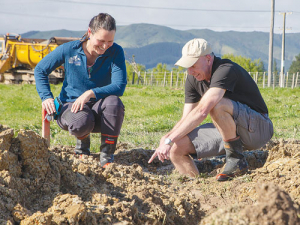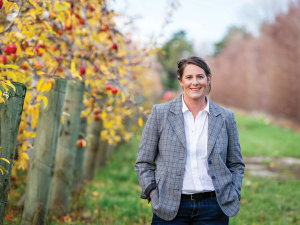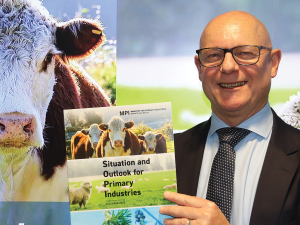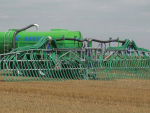Massey University's sheep and beef research farm is to begin nutrient leaching research using underground water and nutrient collection.
Keebles Farm (287ha), near Massey’s Manawatū campus, now has water collection under each paddock to allow all water to be collected and studied.
Deputy head of the School of Agriculture and Environment Professor Paul Kenyon says the farm will be the first to use a collection system of this type for sheep and beef research in New Zealand.
The system allows simultaneous collection of soil water from each of the separate research plots. This allows the researchers to examine the effects of differing herbage types and/or stocking rates on leaching at the same time on the same type of soil and across the seasons and years.
The project is led by Dr Lydia Cranston, Associate Professor Dave Horne, James Milner and Dr James Hanly.
“We are continuing to progress our understanding of what goes on beneath the soil in farms,” says Cranston. “But like any good research project, you need the right tools to measure it accurately. We’ve known for some time that to measure nutrient loss and water runoff from paddocks is quite simple, but it costs a lot to install.”
A similar system has been used in Massey’s Number Four dairy farm for several years, most recently to evaluate the effectiveness of plantain to reduce nitrate leaching.
“We are excited to get out there and use it. Many of us are ready to test ideas we’ve long theorised.”
The trials will start in six months, including a PhD student supervised by Cranston on nutrient loss under intensive sheep grazing.
Associate Professor Tommy Boland from University College Dublin is now at Massey to learn about what Massey is doing at Keebles, as a similar system is being installed at UCD.
The pilot study will compare nitrate leaching when sheep are grazing either a winter brassica forage crop, a plantain based mix, or a ryegrass/white clover mix.
Animal performance including ewe liveweight and condition score, lamb weaning weight will also be monitored for understanding of the effect of each forage type on the overall farm system. The system’s high stocking rate will reflect an intensive sheep production system.
“There is clear potential for our two groups to work together on this research,” Boland says.
“Being in two different hemispheres will allow for quicker progress in understanding the potential impacts across the various seasons because for example we will be able to investigate two winters in a 12 month period.”
In the future, the research site may be used to look at the effect of grazing management and other mitigation procedures on nitrate leaching and look at alternative water contaminants.



















